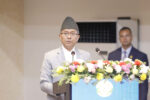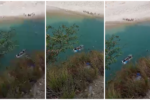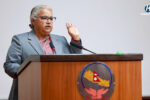MELBOURNE: Australia has lately become a preferred destination for Nepali young generation to pursue higher studies. It is the third country which welcomes the most Nepali students after China and India.
Australia, the world’s sixth-largest country by the total area, has been a dreamland of Nepali students primarily of plus two graduates.
But to arrive here without foreseeing possible challenges, hardship, and difficulties in the future and without becoming mentally prepared for the same and without alternatives in mind to cope with untoward adversities will get anyone in tension and trouble.
Non-Resident Nepali Association, Australia chair Keshab Kandel urged parents/guardians to analyze about such possible circumstances before sending their children here. Students should also be aware of such conditions.
Though official data lacks, it is estimated that Australia is home to over 150 thousand Nepali and they are here for higher studies and for jobs.
The number is on the rise. In the past six months, Australia received 46 thousand newcomers as students from Nepal. History of the commencement of migration from Nepal to Australia dates back to 1975.
People arriving here without preparation and adequate information about the country may find it very hard to find jobs and they may be unable to manage college fees and even face survival needs.
Those arriving here with much preparations and a clear vision about potential future adversities may have high chances of securing a bright future. A double pressure from home and in a new atmosphere may force them to encounter several mental issues.
In case of those landing here in possession of fake marriage certificates, license and just certificates without skills, Australia can be no more a dreamland, but instead be a land of unwanted confusions, sufferings, tensions, mental stress and so on.
Ajita Dawadi who works for a reputed health facility based in Melbourne said she had met with many Nepali students here living with mental issues. “In one hand, they get a pressure from family who had invested much for their aboard journey for sending money back to home and on the other hand they either have to toil hard to find jobs, sometimes are left with jobs at all, or their limited or meager income is insufficient even to pay college fees.
Kandel suggests that at least a student should have a Bachelor or Master’s degree before arriving here and certain skills so that remaining days here could be colorful.
Skills of every household chores, coffee preparation, waiter, housekeeping, front desk and office assistants are highly recommended for them.
Fake driving licenses and skills just in documents are of no use here, according to him.
Nepali Ambassador to Australia Maheshraj Dahal suggested the aspiring Nepali students learn technical and vocational training before coming to Australia.
According to him, those Nepalis coming to Australia without having a fair understanding of its geography, legal provisions, insurance, native Australian cultures and traditions, academic and career prospects among others and without proper vocational and technical skills were found to have faced hardships adaption here in their initial days.
Saying that Australia had equal respect for any work, Ambassador Dahal advised the aspiring Nepalis to learn at least one specialized skill to sustain easily in Australia.
For any Nepalis students in Australia facing any difficulties, the Nepali Ambassador urged them to read the websites of the Nepali Embassy and Non-Resident Nepali Association here or any representatives here and reach out for help.
Furthermore, Dahal advised the aspiring Nepali students willing to come to Australia to do thorough research and verify that if their consultancy company had a branch in Australia or not, if they had registration number, if they had any migration agent or not, among others.
Kandel, on the other hand, advised the Nepali students not to consider coming to Australia for the October session. Talking about things to take into consideration before coming to Australia, he recommended the aspiring students to arrange at least AUD 8,000 for contingency and arrange fees for the first year of university, choose the University or city having friends and relatives or family members there.
Generally, universities here have two sessions but some also have three; October, March and July sessions. Students here often consider taking up ‘summer jobs’ (jobs that a student does during summer vacation) after July when they have a long holiday.
Experts and experienced ones opine that Nepali students should choose their Universities themselves rather than the consultancies back home as the latter could enroll them anywhere which could earn them handsome ‘commission’ easily.
Kandel suggested the Nepali students befriend fellow students quickly once they come to Australia and in case of any emergencies or contingencies, contact the Student Welfare Support Officers which every university here has.
For many issues related to students, the universities here are ready for positive intervention and that’s free of cost.
Chitwan’s Bishnu Adhikari, who has been residing in Australia for over two decades, advises the newcomer Nepalis in Australia to keep themselves engaged with community activities here so as to avoid ‘homesickness’ in the initial days.
Adhikari, founder of Yeti Football Club, shared that since very cities having significant presence of Nepalis have various games organized routinely among the Nepalis, the newcomer Nepalis are advised to engage themselves to keep ‘loneliness’ feeling at bay and adapt to the new environment and the new circle of people.
He viewed that the Nepalis once obtaining education could land up many employment opportunities not only here but also back home. He also suggests giving continuity to the insurance scheme once the Nepali students finish with their education here.
Furthermore, he suggests the aspiring Nepalis to be gender-sensitive and respect males and females equally here. Also, he said that Nepali students should be mentally ready to take up any jobs and remain productive rather than being idle here upon the completion of their education.
Among the immigrants here, the Nepali community enters the job market in the highest number after Brazilians.









Comment